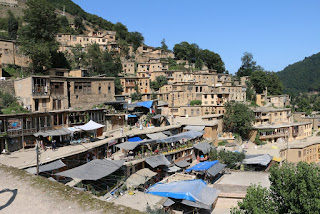 |
| Medressa in Bukhara |
Heading east from the UK in our Landcruiser Camper, intending to circumnavigate the globe over the next few years.
Saturday 27 August 2016
In the footsteps of Historical Legends
Wednesday 24 August 2016
Into Iran and Beyond
 |
| Under Mount Ararat |
 |
| Paddling in the Caspian Sea |
 |
| Massouleh Village |
 |
| Mosque in Esfahan |
Without listing all the fabulous buildings and gardens we visited the highlights:
First the people - genuinely welcoming, we were even stopped on the motorway by a passing car driver who wanted us to visit his village. we were fortunate to spend a couple of evenings with two different families, who were both very generous, interested in our thoughts on Iran and keen to see some of the restrictions removed.
Second the architecture - which is indescribable - especially in Esfahan, where the blue and yellow tilework on the mosques and palaces is exquisite, and the bustle of locals, especially in the evenings is infectious.
 |
| Tomb of Cyrus the Great |
 |
| Persepolis |
The only downside to our visit was that we were in Iran for the hottest time of the year with temperatures up into the 40's
Having collected our Turkmenistan transit visa in Tehran we were able to exit Iran in the north and crossed Turkmenistan in three days, stopping at Ancient Merv overnight. Whereas Iran is all mountains, Turkmenistan in completely flat, with large areas of fertile irrigated land in the south and a large desert in the north. Much of the water for the irrigation is diverted from a river which used to feed the Aral Sea, and is used to grow cotton. The canal was built when Turkmenistan was under Russian rule.
Yesterday we crossed into Uzbekistan, a country which feels much poorer than either Iran or Turkmenistan, but which hosts cities of legend such as Samarkand, Bukhara and Tashkent. Borders are both interesting and frustrating places. Each country had a different procedure, and some such as Iran seem completely disorganised - exiting Iran the passport office had four officers inside, one of whom was dealing with passports while piles of passports handed through a grill were dropped on the floor, or randomly stamped and put into another pile. The officer took around 30 minutes just to deal with ours. On the Turkmenistan side the details of my passport and car were hand written into six separate ledgers and we had to pay $100 for the transit of our car across the country. Entering Uzbekistan the customs officers we fascinated by our binoculars and spent 20 minutes with them scanning the surrounding countryside. In general it seems to take a total of 3 to 4 hours to exit one country and enter the next. Spare a thought for the truck drivers who often spend days waiting to cross a border.
Subscribe to:
Posts (Atom)
